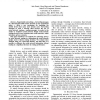Free Online Productivity Tools
i2Speak
i2Symbol
i2OCR
iTex2Img
iWeb2Print
iWeb2Shot
i2Type
iPdf2Split
iPdf2Merge
i2Bopomofo
i2Arabic
i2Style
i2Image
i2PDF
iLatex2Rtf
Sci2ools
134
click to vote
PERCOM
2010
ACM
2010
ACM
Privacy-enhanced social network routing in opportunistic networks
Opportunistic networking - forwarding messages in a disconnected mobile ad hoc network via any encountered nodes - otters a new mechanism for exploiting the mobile devices that many users already carry. Forwarding messages in such a network often involves the use of social network routing- sending messages via nodes in the sender or recipient's social network. Simple social network routing, however, may broadcast these social networks, which introduces privacy concerns. This paper introduces two methods for enhancing privacy in social network routing by obfuscating the social network graphs used to inform routing decisions. We evaluate these methods using two real-world datasets, and find that it is possible to obfuscate the social network information without leading to a significant decrease in routing performance.
Related Content
| Added | 29 Jan 2011 |
| Updated | 29 Jan 2011 |
| Type | Journal |
| Year | 2010 |
| Where | PERCOM |
| Authors | Iain Parris, Greg Bigwood, Tristan Henderson |
Comments (0)

